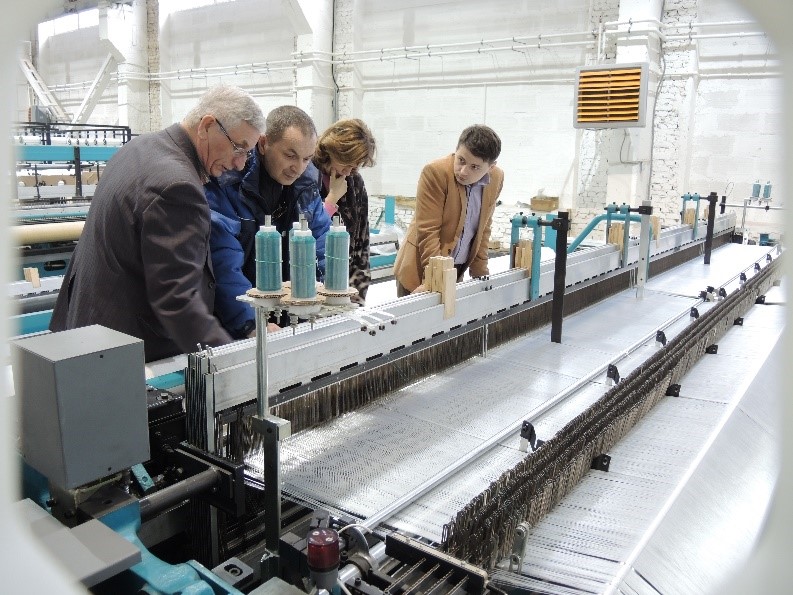Neural Networks for Detecting Manufacturing Defects
The task is to elaborate techniques and models of neural networks multitasking training using the example of a neural network for recognizing different types of fabric faults.

Task
It is of great relevance for both the textile and clothing industries to develop techniques for accurate fabric faults recognition in automatic mode, since traditional recognition methods solve only part of the quality control tasks. The performance of the defect recognition system is affected by the following factors:- A complex pattern that makes it difficult to correctly segment the quality control zone;
- Characteristics variability: defects can vary depending on the stage of control and appear either separately or simultaneously, isolated or combined into a complex defect;
- Defects can look alike though caused by various reasons.
Solution
A technique and models of neural networks multitasking training will be first introduced, as well as their software implementation for integrated control. It will involve the recognition of large width (up to 200 cm) moving rolled materials with a different type of surface design (weaving or printed pattern, various types of threads and ways of mixing and weaving them). To achieve this, the defect classification by prevalence (non-recurring, recurring, permanent) and the effect on the product grade will be performed.
Ivanovo State Polytechnic University (ISPU) textile manufacturing experts are to compile and classify a fabric defects images database for training a neural network, as well as take part in its testing and debugging.
The ISSDP Laboratory experts in computer vision systems and neural network technologies will elaborate general techniques and models for multitasking training of neural networks to detect defects and train a specific neural network for textile manufacture.
A scientific and technical groundwork regarding developing approaches and algorithms capable of making real-time decisions will be laid (including those within the continuous operation). It will include the following:
- Methods of multitasking and generative modelling techniques development;
- A set of specialized software tools, such as cloud computing tools and data mining services;
- New intellectual user-level products design technique based on the above-mentioned achievements of machine learning methodology for light industry enterprises application;
- A set of algorithms and software components and intelligent decision support systems for equipment operators.
The groundwork laid will provide an opportunity to design a whole application class, including for the digital modelling of textile materials and garments, fabric self-patterning, manufacturing control system, accounting systems, as well as an integrated product life cycle support system. Moreover, a methodological framework for automated textile quality evaluation will be established.
Techniques and multitasking training models developed will allow for further studies on learning deep architectures strategies and the development of a promising direction in the field of AI.
Project stages
The project is planned to be implemented over a two-year period (2021-2023)
During the first stage (2021-2022), it is planned to:
- Develop a training reference database for a neural network
- Design models based on the defect detection convolutional neural network
- Provide software implementation of the model based on the defect detection convolutional neural network
- Design a research prototype for fabric faults detection and classification
- Elaborate multitasking training techniques for neural networks to detect and recognize defects
- Develop a defect detection and recognition multitasking training model
During the second stage (2022-2023), it is planned to:
- Design a multitasking defect detection and recognition system
- Develop specialized tools, including cloud computing tools and distributed data mining services for a multitasking defect detection and recognition system.
- Testing of a multitasking defect detection and recognition system.
- Analysis of the results obtained and making recommendations to the use of a multitasking defect detection and recognition system
At the moment, within the first stage of the project, the selection of equipment for the images database compiling is underway, the training reference database for a neural network (including sampling of defective materials and their primary classification for photographing) is being developed, the test installation for fabric faults detection and classification has been designed.
Technologies
| Libraries and frameworks | OpenCV, PyTorch, TensorFlow, CUDA, libpng |
| Software programming languages | Python, C++ |
| OS | Linux |
| Architectures | x64, ARM |
| CVS | Git (GitLab) |
Project team
- Chief Scientist: T.Y. Kareva, Doctor of Technical Sciences, Professor at Ivanovo State Polytechnic University
- Project manager: M.V. Bolsunovskaya, Head of the Industrial Systems for Streaming Data Processing Laboratory, NTI Center, SPbPU
- Lead engineer: A.V. Boykov
- Data analysts: N.A. Abramov, A.V. Cherkas, Y.V. Khutornoy
- Lead supervisor: S.V. Shirokova